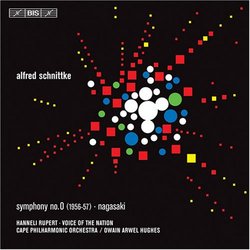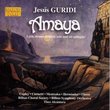| All Artists: Alfred Schnittke, Owain Arwel Hughes, Hanneli Rupert, Cape Philharmonic Orchestra Title: Alfred Schnittke: Symphony No. 0; Nagasaki Members Wishing: 0 Total Copies: 0 Label: Bis Original Release Date: 1/1/2007 Re-Release Date: 5/29/2007 Album Type: Import Genre: Classical Styles: Opera & Classical Vocal, Historical Periods, Modern, 20th, & 21st Century, Symphonies Number of Discs: 1 SwapaCD Credits: 1 UPCs: 675754992026, 7318590016473, 067575499202 |
Search - Alfred Schnittke, Owain Arwel Hughes, Hanneli Rupert :: Alfred Schnittke: Symphony No. 0; Nagasaki
 | Alfred Schnittke, Owain Arwel Hughes, Hanneli Rupert Alfred Schnittke: Symphony No. 0; Nagasaki Genre: Classical RUPERT (SOP) CAPE TOWN OPERA VOICE |
Larger Image |
CD DetailsSynopsis
Product Description RUPERT (SOP) CAPE TOWN OPERA VOICE Similar CDs
|
CD ReviewsIvashkin relentless efforts rewarded! villegem | canada | 06/22/2007 (5 out of 5 stars) "Alexandre Ivashkin, Schnittke biographer and gatherer of the Schnittke archives in London has persuaded Irina Schnittke to release the rights for the two works by a 22 then 24 years old composer still in the graduate program of the Moscow Conservatory. Symphony No.0 is of course totally inspired by Shostakovitch. However in a twist we learn that the slow movement of this symphony may have indeed inspired him in his own 11th symphony slow movement beginning (double bass pizicatti). Staged for a modest size orchestra, the symphony is very tamed by Schnittke's standards. However the slow movement is a forebearer of greatness. It will take another 12 years before Schnittke would start writing the seminal first symphony... Written two years after Symphony No.0, it is a much more confident Schnittke who writes the oratorio Nagasaki and this is felt from the get go. Set for a larger ensemble and chorus, Schnittke's influence is surely Carl Orff "Carmina Burana" but there is no msitaking some original orchestrations for anyone else. Indeed I also found similarities with sonorities explored in Britten's War Requiem, a few years later. Schnittke rewrote the finale -to the disappointment of Shostakovich we learn, who liked the first version and regretted to see Schnittke bowing to external pressures... But the lesson of independence was learned as we've seen much later during Schnittke's career!-. My regret is that the South African choir is not Russian speaking and thus not as clear as one would like. But this critic is minor compared to the formidable effort it took to stage the premiere of this piece in Cape Town, in November 2006. Ivashkin and those who have contributed to making this CD possible deserve our appreciation and our support. Schnittke fans will no doubt find this recording a must have. The orchestra is very good and well conducted. The recorded sound is solid with plenty of Organ bass in the oratorio. In conclusion, Thank you Alexander Ivashkin: now we need the dedicatee of Symphony No.9 to record this last symphony!" Clearly juvenalia, but the symphony's not bad Christopher Culver | 06/09/2010 (3 out of 5 stars) "Over the decade since Alfred Schnittke's death, a great deal of early works have come to light. This BIS disc contains two such pieces from the late 1950s. Arwel Owain Hughes leads the Cape Philharmonic Orchestra. Right off I felt that we are not at all dealing with "mature Schnittke" here, as these works lack the composer's trademark zaniness evident even in early works of the 1960s like the Second Violin Concerto. Nonetheless, they are an interesting document of Schnittke's development.
Though Schnittke's Symphony No. 1 of 1970 was his first mature effort in the symphonic genre, he had in fact written a symphony in 1956-57 while a student at the Moscow Conservatory. This retrospectively titled Symphony No. 0 is much indebted to Shostakovich, especially in orchestration. The constantly recurring theme in the second movement might well be a hommage to the "Bolero"-like theme of Shostakovich's "Leningrad" Symphony. I don't much care for Shostakovich's heart-on-sleeve Romanticism and didn't expect to enjoy this work, but I was pleasantly surprised to find that Schnittke endowed the work with a great deal more emotional balance than his model, and there's an almost neoclassical lightness to some portions. Sure, it's a bit overlong and not entirely original, but it's a finely wrought symphony and I enjoy hearing more than some of Schnittke's late symphonies. "Nagasaki" (1958) is an oratorio for mezzo-soprano, mixed choir and orchestra on a texts by Anatoli Sofronov, Georgi Fere, Yoneda Eisaku and Shimazaki Toson. It is divided into five moments, of which the third is notable for its depiction of the dropping of the bomb with foreboding choral intonations and percussion. Stylistically, it follows the poignant third movement of the Symphony No. 0, but ultimately I found it dull, dull, dull. Perhaps the subject matter didn't allow much change from a uniformly grim mood, but that just makes for exhausting listening." |




